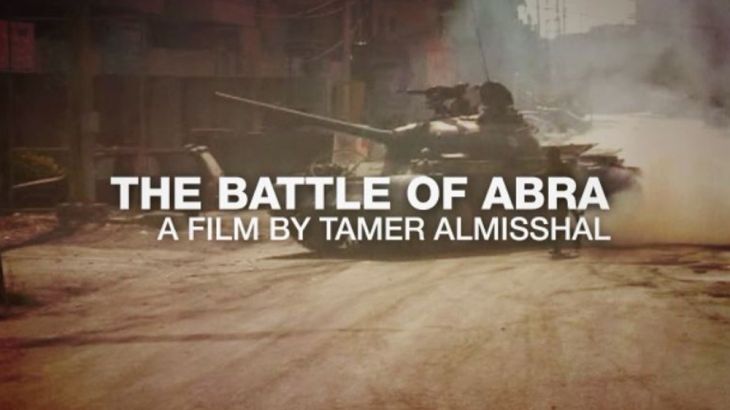
Lebanon: The Battle of Abra
We investigate an incident highlighting tensions in Lebanese politics, the role of Hezbollah and the sectarian divide.
Filmmaker: Tamer Almisshal
Al Jazeera Arabic reporter Tamer Almisshal investigates a confrontation in 2013 that highlights the serious tensions in Lebanese politics, the rise and role of Hezbollah, the emergence of Salafi-inspired groups and the depth of the country’s continuing sectarian divide.
Keep reading
list of 4 itemsMapping Israel-Lebanon cross-border attacks
What will the future bring between Hezbollah and Israel?
Cross-border fighting with Israel leaves Lebanese towns in ruins
What became known as the Battle of Abra is supposed to have begun with the killing of three soldiers in an attack by armed supporters of the conservative Sunni cleric Ahmed al-Assir. They’re alleged to have attacked an army checkpoint in Sidon’s Abra neighbourhood on June 23, 2013. Two days of intense fighting followed, resulting in the deaths of at least 17 Lebanese soldiers, more than an estimated 30 of Al-Assir’s supporters, two civilians and (according to some accounts) two men associated with Hezbollah.
The fighting was the culmination of tension that had been building for the previous year, with Al-Assir seemingly always at the centre of the storm.
Accounts of the Battle of Abra vary but nearly four years on, the question as to who really fired the first shot still seems to remain unanswered. Al-Assir’s supporters accuse Hezbollah of provoking it – and the Lebanese army of denying the armed Shia faction was involved at all.
”I
. I believe the army.”]
Al-Assir’s rise to prominence had accelerated in 2011 as the war in Syria grew.
He spoke out against what he saw as increasing Hezbollah influence in Sidon and elsewhere. His anti-Shia rhetoric attracted strong support, including from the famous singer Fadel Shaker. Shaker is shown in a video clip in the film, boasting about his part in the execution of two Hezbollah members.
But after what happened at Abra, al-Assir became a wanted man, not least because the Lebanese army uncovered caches of heavy weaponry within his “safe area” at the Bilal bin Rabah Mosque and in the surrounding compound, as previously reported by Al Jazeera.
He was arrested at Beirut’s Rafic Hariri International Airport on August 15, 2015, when he tried to flee the country in disguise. He remains in Beirut’s Roumieh prison awaiting the resumption of his military trial in June 2017.
On the day of the battle, Lebanese security forces recorded CCTV footage appearing to show al-Assir’s group involved in the attack on the army checkpoint. The sequence purportedly features Ahmed al-Hariri, the manager of Ahmed al-Assir’s compound, who is still wanted by the Lebanese authorities.
Almisshal tracked him down, and when asked why he was at the army checkpoint minutes before the fighting, al-Hariri says: “We went to the checkpoint to investigate what happened to the two young men [arrested by Lebanese soldiers]. They said there was no swearing but that they were beaten … We also wanted to ask if [the army] could move the checkpoint back a bit so that the entrance of the [Bilal] mosque could be prepared for worshippers as it was prayer time.
“That’s the moment that they [Hezbollah] fired on us. They fired from the apartments next to KFC. As soon as the checkpoint was fired on, the apartments next to the Bilal mosque fired on the mosque. This proves that there was coordination between the apartments next to KFC and those next to the Bilal bin Rabah mosque.”
Sheikh Maher Hammoud, the president of the International Union of Resistance Scholars, denies that Hezbollah fired from any of the apartments.
“There were Hezbollah apartments for observation and contingency,” says Hammoud. “But they didn’t take part and they certainly didn’t start it.”
The Lebanese army corroborates this version of events. The Lebanese Interior Minister at the time, Marwan Charbel, also ruled out that a third party was involved in the battle. “I asked members of the Lebanese army and they told me. I believe the army.”
As al-Assir is still in jail, Al Jazeera’s Almisshal wrote to ask him why his supporters clashed with the Lebanese army in Abra. He replied, saying his group had not been able to negotiate an agreement with the army on the ground because it wanted them to leave. He labelled it “a conspiracy from all the political parties”. He also mentioned a call from Interior Minister Charbel telling him of a decision to end his presence in the region.
Charbel denies this and says: “I didn’t speak to him except one time when we moved tents. After that we never spoke.”
Four years on, the Battle of Abra serves as a telling example not only of the complexity of Lebanese politics, but of the depth of the sectarian divide and how easily it can lead to violence. It also highlights the government’s inability to deal effectively with the country’s many conflicting interests.